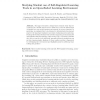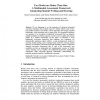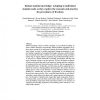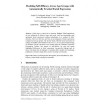AIED
2015
Springer
9 years 10 months ago
2015
Springer
This paper proposes an approach for creating and testing an multiagent systems based adaptive social educational game (SEG), QuizMASter, using the concept of simulated learners to ...
AIED
2015
Springer
9 years 10 months ago
2015
Springer
We present AttentiveLearner, an intelligent mobile learning system optimized for consuming lecture videos in both Massive Open Online Courses (MOOCs) and flipped classrooms. Attent...
AIED
2015
Springer
9 years 10 months ago
2015
Springer
This paper discusses a design-based research study that we conducted in a middle school science classroom to test the effectiveness of SimSelf, an open-ended learning environment ...
AIED
2015
Springer
9 years 10 months ago
2015
Springer
We are beginning to see the emergence of advanced automated assessment techniques that evaluate expressive student artifacts such as freeform written responses and sketches. These ...
AIED
2015
Springer
9 years 10 months ago
2015
Springer
Abstract. Recent years have witnessed major research advances in sensorbased affect recognition. Alongside these advances, there are many open questions about how effectively curre...
AIED
2015
Springer
9 years 10 months ago
2015
Springer
A framework is proposed for automated generation of self-explanation questions in worked examples. In the framework, in addition to the questions, the correct answer, distracters a...
AIED
2015
Springer
9 years 10 months ago
2015
Springer
Robust knowledge consists of both conceptual and procedural knowledge. In order to address both types of knowledge, offering students opportunities to explore target concepts in a...
AIED
2015
Springer
9 years 10 months ago
2015
Springer
Data recorded while learners are interacting with Massive Open Online Courses (MOOC) platforms provide a unique opportunity to build predictive models that can help anticipate futu...
AIED
2015
Springer
9 years 10 months ago
2015
Springer
Affect plays a central role in learning. Students’ facial expressions are key indicators of affective states and recent work has increasingly used automated facial expression tra...
AIED
2015
Springer
9 years 10 months ago
2015
Springer
Supporting students during learning tasks is the main goal of intelligent tutoring systems, and the most effective systems can adapt to students based on a model of their current s...






